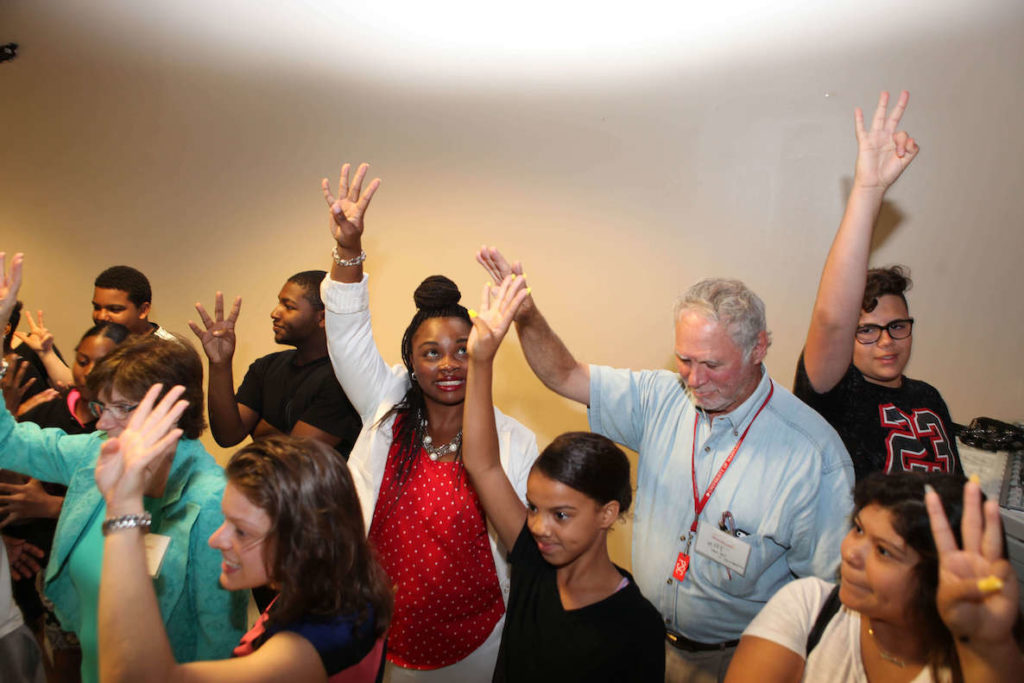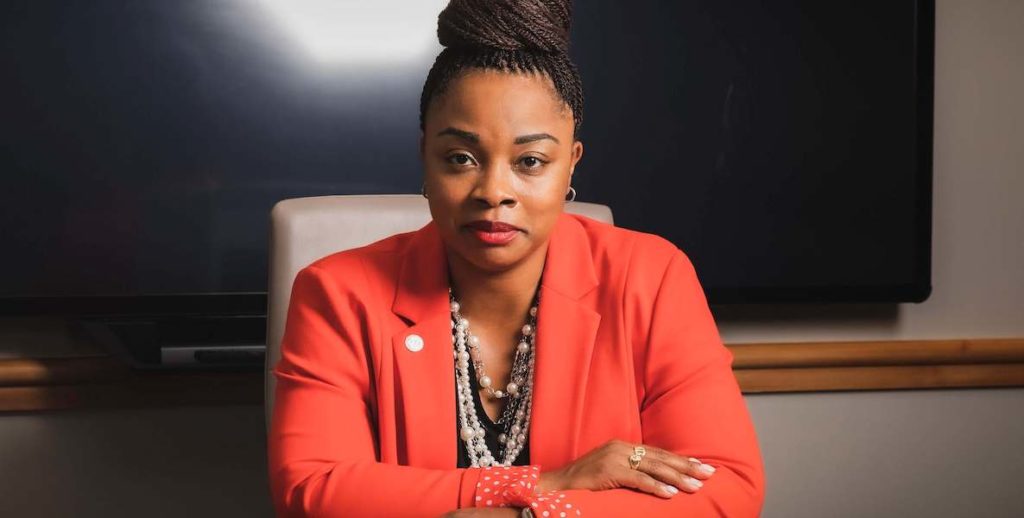Every day, as Chekemma Fulmore-Townsend works to create opportunities for young, often impoverished teens and young adults in Philadelphia, she never loses sight of what drove her to her line of work in the first place: her own childhood in Brooklyn, and the loving, dedicated people who opened her eyes to the possibilities beyond it.
Fulmore-Townsend grew up Bed-Stuy — late-’80s/early-’90s Bed-Stuy, drug-infested Bed-Stuy, not today’s hipster Bed-Stuy — surrounded by strong female role models.
“My first teacher was my grandmother, who is my blueprint for womanhood, for personhood,” she says. “She’s a woman of faith, she always put family first, she’s a hard worker, she’s a thorough person, she’s kind, and she’s always intentional.”
It was grandma who called the shots as Fulmore-Townsend was growing up; mom and dad were both teenage parents who struggled with drug addiction during their daughter’s younger years. “My grandmother would always tell me that I had choices and that I could be anything I put my mind to, but I had to get an education,” she says.
“I grew up in poverty. I am in the cycle-breaking generation of my family, and I’m also alive to see the first generation of my family who has never had an impoverished day in their life in my own children. And so there’s a long arc to change, but I can tell you the life that I live now was unimaginable to me then,” says Fulmore-Townsend.
Then there was Evelyn Woods, the school librarian when Fulmore-Townsend was in second grade. Fulmore-Townsend got selected to represent her school in a storytelling contest, which meant that while all of her friends went off to jump rope during recess, she’d go to the school library and work with Woods on skills like memorization and enunciation.
“She just gave me no other choice but to be excellent,” Fulmore-Townsend says. “There was no negotiating. It was like, You are excellent and this is what excellence looks like, and this is what I expect from you.”
That experience as an 8-year-old? It changed her life.
“It taught me that I could become a better version of myself with practice and support,” she says.
It was another Black woman, the late Paula V. Holmes, who exposed her to a program that led her, at 14, to head off to boarding school at the prestigious Groton School in Massachusetts. Then it was off to Penn for undergrad and grad school.
The path of productive exploration

Now, in her role as the president and CEO of Philadelphia Youth Network, Fulmore-Townsend is committed to providing youth with the same kinds of connections and support she feels grateful to have had throughout her life.
“To be honest, I knew that I was growing up on welfare, but I always felt a wealth of another kind because I always felt loved by my parents and confident in my future,” she says. “And I want that for every young person — I don’t want it to be happenstance, I don’t want young people to have to find their ‘second grade teacher.’”
That’s why Fulmore-Townsend has spent the last 16 years, including the last seven as president and CEO, at Philadelphia Youth Network. PYN’s vision, you see, is nothing short of “alleviating poverty and promoting equity through education and employment.”
Since 1999, PYN (“pin,” as folks in the know call it) has provided more than 225,000 opportunities for young people in the city to get paid work experience and develop career readiness skills. For each of those paid opportunities, money has been put in the pockets of Philly young people — and then, data shows, circulated back into their communities. In 2019-2020 alone, for example, a total of $4,206,538 was distributed to youth via wages and incentives.
“I don’t think the result is for any young person to find their forever job,” says Fulmore-Townsend. “The real success measure is asking What is now possible as a result of your experience?”
But more than putting money in their pockets, which is of course critical, PYN has opened young people’s eyes to possibilities. “Sometimes work is presented like the pinnacle of something, like once you get this job, you’ve arrived. And that just could not be further from the truth,” Fulmore-Townsend says. “You have to learn more when you get a job. Learning doesn’t stop! Growth doesn’t stop.”
She believes that job and early career exposure put a young person on a path of productive exploration — meaning it’s just as valuable to figure out what you do like to do as what you don’t. “I don’t think the result [of PYN] is for any young person to find their forever job,” she says. “The real success measure is asking What is now possible as a result of your experience?”
Jude Husein was 14 and growing up in a single-parent household in North Philly when her mom encouraged her to apply for PYN’s WorkReady program. “Resources were limited, but PYN was a way to get out of my neighborhood and see what else was out there,” she says. She spent one summer working at JEVS, the next in the DA’s office, in the homicide division. That led her to relationships with mentors she still has, all these years later.
Now 23, Husein works in the nephrology department at CHOP, and serves on the Mayor’s Youth Commission as chairwoman of jobs and economics, and as a consultant for after-school activities partnerships. PYN, she says, instilled in her a desire not to leave Philly, but to make it better.
“It’s super-easy to tell a young person who’s been through hell and back to keep going, but in order to actually keep going, you need to know that people believe in you,” Husein says. “And PYN believes that young people matter, that young people are the future leaders of this city. And that starts with understanding your circumstances and not letting those circumstances deter you.”
“She jumps right in and problem-solves.”
That commitment to planting the seeds for the future of Philly and its leaders speaks to the mission of Generation Change Philly, our ongoing project with Keepers of the Commons to spotlight and support the local doers who are making meaningful, long-term positive impacts on our city. It’s why, as Citizen writer Christine Speer Lejeune reached out to in-the-know Philadelphians for candidates for this series, Fulmore-Townsend’s name continued to surface.
Jeff Brown has been on the PYN board, of which he’s currently chair, for 20 years. He’s the president and CEO behind the community-minded Brown’s ShopRites and serves as chairman of the State Workforce Development Board; constantly in touch with employers across sectors, he knows good leaders when he sees them. Brown, who is eying a run for mayor, believes Fulmore-Townsend is unique among leaders for a myriad of reasons.
RELATED: Read more about the Generation Change Philly project
“She’s been there. She grew up in difficult circumstances, and I think it adds to your leadership abilities to be able to empathize and walk in young people’s shoes,” Brown says. “She’s also very hard-charging: She doesn’t sit back and complain, even in troubled times like the pandemic. She just jumps right in and problem-solves.”
Notably, during the pandemic, Fulmore-Townsend oversaw a pivot perhaps unlike any other summer youth program: More than 6,100 students still found paid work opportunities, with 85 percent of them working digitally, and 15 percent working safely in-person.
“Third,” Brown goes on, “she has a real intellectual rigor. PYN combines multiple funding sources from various levels of government and the private sector and philanthropy, and they all have rules. It’s complicated, and Chekemma is rigorous about doing this work so that the money goes towards helping young people, and not towards overhead.”
Of course she’s caring, Brown says, but “caring is just the start. You have to bring skills and tools and a team to turn it into a real thing.”
“Everybody has a light”
As she continues to lead her 57-person staff through the pandemic and beyond, Fulmore-Townsend has her eyes on evolution and growth. She believes that, as a society, we have to establish a new contract about work with young people; she’s focused on diversifying pathways to careers and exposure and employment, expanding PYN’s entrepreneurship efforts, tech pathways, entertainment and content-creation opportunities. And in the ever-competitive playing field for donor dollars, she’d like to establish multi-year funding, as a way to reach even more young people every year.
Still, in a city where the poverty rate hasn’t moved from its staggering and seemingly stagnant 24-percent, and young people are rightfully and increasingly skeptical of older generations, how does she get through to them, keep them coming back for employment and feedback and communication with her and her team?
“That’s really what my life’s work has been about. It’s my way of saying thank you,” she says, coming back to the early mentors she had along the way. “It’s my way of honoring all the investments that were made in me, and making sure that other young people know it’s possible.”
“I can point to very real, hard moments in my own life. I grew up in poverty. I am in the cycle-breaking generation of my family, and I’m also alive to see the first generation of my family who has never had an impoverished day in their life in my own children,” she says. “And so there’s a long arc to change, but I can tell you the life that I live now was unimaginable to me then. So I’ve tried to make sure that young people understand that this is your life right now, but it doesn’t have to be your forever. You have dreams, you have talents, you have abilities — now, how are you going to make intentional choices to cultivate that life?”
Fulmore-Townsend doesn’t sugarcoat her journey for young people either. “Sometimes it does require sacrifice. Sometimes it does require being teased, or doing something new, or getting out of your current environment. It does require risk-taking. But you already know how the story ends if you don’t change,” she says. “I just try to remind young people how much we’re the same. I don’t think that there’s anything super-special about me that’s not special about anybody else. Everybody has a light. I want to create experiences that will introduce you to adults and options: adults who can cheer you on, and options so that you have a choice for what comes next in your future.
“That’s really what my life’s work has been about. It’s my way of saying thank you,” she says, coming back to the early mentors she had along the way. “It’s my way of honoring all the investments that were made in me, and making sure that other young people know it’s possible.”
The Philadelphia Citizen is partnering with the nonprofit Keepers of the Commons on the “Generation Change Philly” series to provide educational and networking opportunities to the city’s most dynamic change-makers.
MORE ON LOCALS WORKING TO FIGHT POVERTY IN PHILLY

